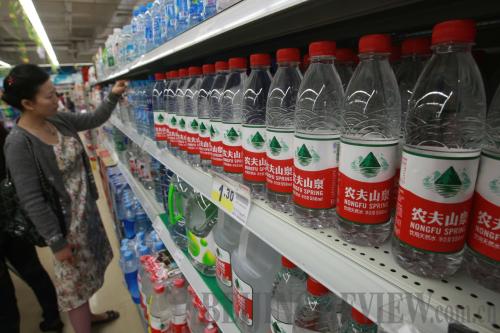|
 |
|
DRINK ME: A consumer chooses bottled drinking water in a supermarket in Chongqing on May 14, 2011 (CFP) |
When interrupted by a reporter at a news conference on May 6, Zhong Shanshan looked embarrassed by what would later turn into a chaotic scene. The 59-year-old man, founder of Nongfu Spring, China's second largest bottled water producer, appeared lacking in crisis management skills. During the question-and-answer period, the conference quickly descended into a war of words with reporters from Beijing Times, which insisted its reports about the company's water quality had been "factual" and "well-grounded."
Zhong, once a journalist himself for a paper in his home province of Zhejiang, slammed the Beijing-based daily for writing a total of 67 pages criticizing Nongfu Spring with claims that the company's products were inferior to tap water. "Nongfu Spring has decided not to lower its head to media attacks," said Zhong at the press. "We can't produce water under such circumstances." Following the scandal, Nongfu has decided to halt production of barreled water—or 19-litre jugs—for the Beijing market.
Emphasizing that every drop of Nongfu spring comes from natural water sources, the company has hitherto made up more than 20 percent of China's bottled water market. However, successive reporting by Beijing Times has recently thrown the company's legitimacy into doubt. To safeguard its reputation, Nongfu Spring has filed a lawsuit demanding 60 million yuan ($9.77 million) in compensation for what it believes is unfounded criticism of its water quality practices. Yet, the potential damage to its long-term viability is uncertain.
Thrown into doubt
The dispute began on April 10, when Beijing Times published a report with a headline, "Nongfu Spring's standards are lower than tap water," accusing Nongfu Spring of adopting the water-quality standards of Zhejiang Province instead of stricter national standards, even though the water was sold all over China. The permitted amount of toxic arsenic must be no more than 0.01 mg per liter, according to the national standard, but the allowed maximum amount is 0.05 mg per liter according to Zhejiang standards.
"We didn't label national standards on our product because they are mandatory, and we are also supervised by national standards in production," said Zhong at the conference. "When there are different requirements for these standards, we always choose to abide by the strictest requirement," Zhong said.
Now, the factory had ceased the production of barreled drinking water in Beijing, although no quality issues have been found since the factory opened in 2008.
The Beijing plant made a profit of 4.2 million yuan ($683,760) last year, while profits this year are estimated to reach 5 million yuan ($813,000). According to Yuan Jun, Vice Chairman of Beijing Association for Barreled Drinking Water, the high-and-medium-end barreled water market in Beijing is now mainly occupied by big brands, such as Nestle, Robust, Wahaha and Cestbon. Among them, Nongfu Spring made up roughly 1.5 percent of market share. The withdrawal from Beijing would deprive the company of 100,000 customers and put 450 water delivery workers out of work.
|
